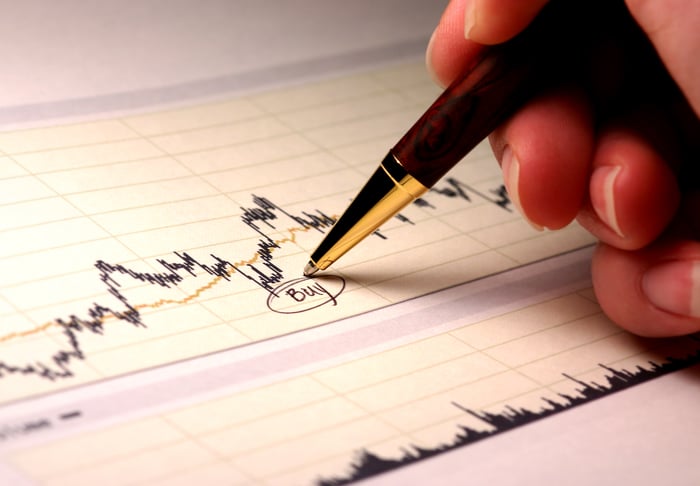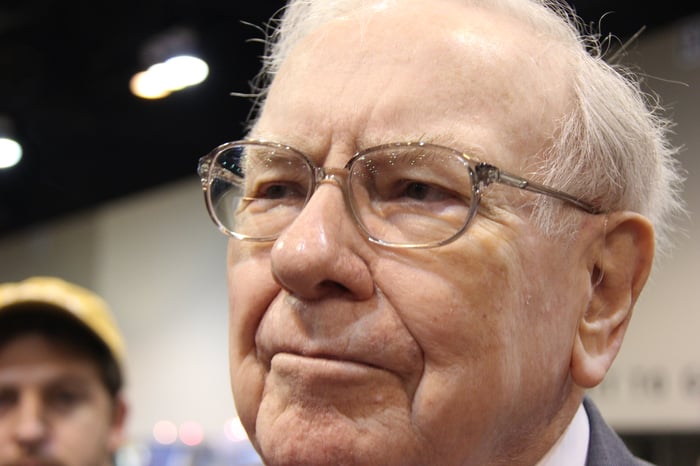For nearly six decades, Berkshire Hathaway (NYSE: BRK.A)(NYSE: BRK.B) CEO Warren Buffett has left an indelible mark on Wall Street with his investment acumen. Since taking the helm in the mid-1960s, the Oracle of Omaha has steered his company to a remarkable greater than 4,450,000% aggregate return in its Class A Shares (BRK.A), as of the close of trading on January 12.
Buffett has a knack for identifying long-term winners, and investors everywhere eagerly await his and his investment team’s latest moves. Interestingly, the stock that Buffett has regularly acquired isn’t the first one that comes to mind.

Berkshire Hathaway CEO Warren Buffett. Image source: The Motley Fool.
Buffett’s Consistent Stock Purchases
Investors can take solace in the fact that Berkshire Hathaway is obligated to file Form 13F with the Securities and Exchange Commission no later than 45 days after the end of each quarter. A 13F offers a behind-the-scenes peek at the buys and sells by Wall Street’s finest in the previous quarter and is a required filing for entities with at least $100 million in assets under management.
As of the close of trading on Jan. 12, Berkshire Hathaway’s investment portfolio held $361 billion of invested assets across roughly 50 stocks. Some of these stocks have been consistently grown over recent years.
Energy stock Occidental Petroleum (NYSE: OXY) is a prime example of a core holding that has commanded the attention of Warren Buffett and his “investing lieutenants,” Todd Combs and Ted Weschler, over the past couple of years.
At the beginning of 2022, Berkshire Hathaway held $10 billion in Occidental preferred stock with an 8% annual yield and no common shares. However, the company now owns slightly over 243.7 million shares of Occidental Petroleum common stock, amounting to a greater than $14.1 billion stake.
The reason behind Berkshire’s frequent purchases of Occidental shares over the past two years likely stems from the anticipation of sustained or escalating crude oil prices. Years of inadequate capital investment by global energy giants during the pandemic, combined with the uncertainty surrounding Russia’s ongoing conflict with Ukraine, have led to a constrained global supply of crude oil. Typically, when the supply of a crucial commodity is restricted, it’s common for the spot price of that commodity to rise.
Occidental Petroleum stands out among integrated oil and gas operators due to its disproportionate revenue from upstream (drilling) operations. A surge in crude oil prices would disproportionately benefit Occidental. Naturally, the opposite holds true as well—if the spot price of crude oil declines.
Warren Buffett has also been increasing his company’s position in tech giant Apple (NASDAQ: AAPL). Since Berkshire’s initial stake in Apple was established in the first quarter of 2016, it has expanded to nearly 915.6 million shares and represents 47.1% ($170.2 billion) of invested assets.
Given Buffett’s characterization of Apple as “a better business than any we own” at Berkshire’s 2023 annual shareholder meeting, it’s unsurprising that he and his team have been building this position for years. Apple brings unparalleled brand power and consistent innovation to the table, unlike many other businesses.
For example, Apple has dominated the U.S. smartphone market for well over a decade. Since introducing a 5G-capable iPhone in the fourth quarter of 2020, the company has consistently held just over half of the U.S. smartphone market share.
Apple is also transitioning into a platforms company. Emphasizing subscription services is a strategy to enhance long-term margins, reduce sales fluctuations during major iPhone upgrade cycles, and foster customer loyalty to its suite of products and services.
Then there’s Apple’s exceptional capital-return program. The company is returning $15 billion in dividends to its investors annually and has repurchased over $600 billion of its common stock since launching its buyback initiative in 2013.

Image source: Getty Images.
Consistent Purchase of a Particular Stock
Berkshire Hathaway’s 13F provides a valuable way for investors to gauge the stocks, industries, and trends that have captured the interest of Warren Buffett and his lieutenants. Nonetheless, it doesn’t tell the full story—especially regarding Buffett’s favorite stock.
Berkshire Hathaway Stock Repurchase Program: A Steady Reward for Investors
Buffett’s Favorite: Buying His Own
While Berkshire Hathaway is known for its core holdings, what stands out in Warren Buffett’s investment strategy is his consistent purchase of his own company’s stock. A rarity in the investing world, this steadfast loyalty to Berkshire Hathaway has been displayed through a share repurchase program that has continued almost monthly since July 2018.
Boardroom Shifts and Buybacks
Traditionally, buybacks were limited, as the stock needed to trade at or below 120% of book value. However, a significant shift occurred on July 17, 2018, when Berkshire Hathaway’s board expanded the parameters of the repurchase program. This change essentially granted Warren Buffett and his late associate Charlie Munger the freedom to engage in buybacks as they saw fit, provided the company maintained a robust financial position.
A Streak of Buyback Approval
Since this pivotal change, which extends through September 30, 2023, Buffett and Munger have given the green light for share buybacks in all 21 quarters. This consistent approval resulted in more than $72 billion worth of Berkshire Hathaway stock being repurchased since mid-2018.
Share Buybacks as Shareholder Rewards
For Berkshire Hathaway, share buybacks are a direct way to reward long-term shareholders. As the company does not pay a dividend, regular buybacks can steadily increase the ownership stakes of its faithful investors.
Strengthening Stock Attractiveness
Moreover, the consistent or growing net income of companies like Berkshire, excluding unrealized investment gains and losses, results in a climb in earnings per share as the number of outstanding shares decline. This financial strategy further enhances the appeal of Berkshire’s stock to fundamentally focused investors.
Confidence in Future Buybacks
Looking ahead to 2024, there is unwavering confidence that Warren Buffett will continue to demonstrate his allegiance to Berkshire Hathaway through further stock buybacks.
Considerations for Investors
When contemplating investment in Berkshire Hathaway, it is essential to weigh the impact of its ongoing share repurchase program and its potential effects on the company’s attractiveness to shareholders.
Before considering investment, it is crucial to conduct thorough due diligence and seek professional financial advice.

